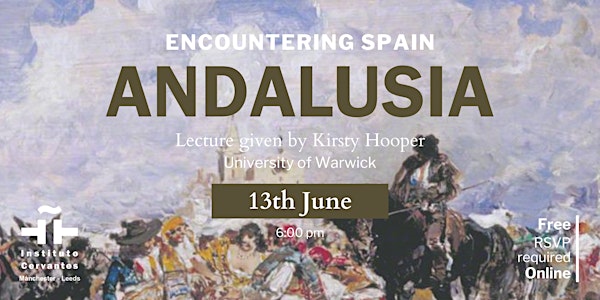
Encountering Spain: Andalusia
Explore Spain through British travellers
Date and time
Location
Online
About this event
- 1 hour 30 minutes
This series of talks will explore three diverse parts of Spain, from the perspective of 19th- and early 20th-century British travellers and ex-pats who encountered a country they found surprisingly different from the ‘Sunny South’ of Romantic legend. Using their own words and images, we will follow in their footsteps to discover what drew them off the beaten track, which of the sites and sights they experienced they found most noteworthy, and how they made sense of their encounters for their audiences back home.
First talk: Andalusia
For 19th-century Britain, the southern region of Andalusia was the epitome of wild, Romantic Spanishness. The popular figures of the gipsy Carmen, bullfighters and bandoleros, together with the Moorish sites and sights of Granada, Córdoba and Sevilla were seared into the British popular imagination through literature, music and art. But Victorian and Edwardian travellers arriving in Andalusia by rail or sea were often surprised by the region’s busy commercial settlements and great modern cities, such as Málaga, which in 1897 became home to the first professional organization aimed at attracting tourists to Spain. In this talk, we’ll explore 19th- and early 20th-century British tourists’ and travellers’ experiences in Andalusia, a region many felt they knew, but soon discovered they did not.
Kirsty Hooper is a Professor of Hispanic Studies at Warwick University, and a specialist in Spanish, Anglo-Spanish and Galician cultural history since 1800. Her books include Writing Galicia into the World (2011), Mondariz-Vigo-Santiago: A Brief History of Galicia’s Edwardian Tourist Boom (2013) and The Edwardians and the Making of a Modern Spanish Obsession (2020). She currently holds a Leverhulme Major Research Fellowship for the project Hispanic London: Culture, Commerce and Community in the Nineteenth-Century City (2020-2023).
Online activity
Activity in English (simultaneous interpretation into Spanish).
You can watch the series talks' on our YouTube channel.
For more information, please contact cultman@cervantes.es
Este ciclo de conferencias explorará tres partes distintas de España, desde la perspectiva de los viajeros y expatriados británicos del siglo XIX y principios del XX, que se encontraron con un país que les pareció sorprendentemente diferente del "Sur soleado" de la leyenda romántica. Utilizando sus propias palabras e imágenes, seguiremos sus pasos para descubrir qué les atrajo fuera de los caminos trillados, qué sitios y lugares de interés experimentaron, que les parecieron más dignos de mención, y cómo dieron sentido a sus encuentros para su público en casa.
Primera sesión: Andalucía
Para el Reino Unido del siglo XIX, Andalucía representaba la personificación de la esencia salvaje y romántica de lo español. Figuras populares como la gitana Carmen, los toreros y los bandoleros, junto con los sitios y paisajes moriscos de Granada, Córdoba y Sevilla, quedaron grabados en la imaginación popular británica a través de la literatura, la música y el arte. Sin embargo, los viajeros victorianos y eduardianos que llegaban a Andalucía por ferrocarril o por mar solían sorprenderse por los bulliciosos asentamientos comerciales de la región y las grandes ciudades modernas, como Málaga, que en 1897 se convirtió en el hogar de la primera organización profesional destinada a atraer turistas a España. En esta charla, exploraremos las experiencias de los turistas y viajeros británicos del siglo XIX y principios del XX en Andalucía, una región que muchos creían conocer, pero pronto descubrieron que no era así.
Kirsty Hooper es catedrática de Estudios Hispánicos en la Universidad de Warwick, y especialista en historia cultural española, anglo-española y gallega desde 1800. Entre sus libros se incluyen Writing Galicia into the World (2011), Mondariz-Vigo-Santiago: A Brief History of Galicia's Edwardian Tourist Boom (2013) y The Edwardians and the Making of a Modern Spanish Obsession (2020). Actualmente, es titular de una beca 'Leverhulme Major Research Fellowship' para el proyecto 'Hispanic London: Culture, Commerce and Community in the Nineteenth-Century City' (2020-2023).
Actividad en línea y en inglés (con interpretación simultánea al español).
Disfruta de todas las charlas de la serie en nuestro canal de YouTube.
Para más información, contactar: cultman@cervantes.es
Want to learn Spanish?
Why learn Spanish at the Instituto Cervantes?
We have online and in-person language classes for all levels. See our schedule here.
Organised by
The Instituto Cervantes, the official Spanish Government Centre, is a public institution founded in 1991 to promote Spanish language teaching and knowledge of the cultures of Spanish speaking countries throughout the world.